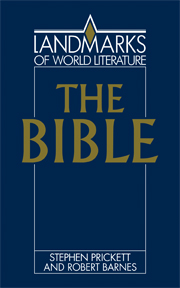4 - Interpretation of the Bible
Published online by Cambridge University Press: 19 January 2010
Summary
The reader who has come so far will be conscious of the fact that even the word ‘interpretation’ is ambiguous in the context of the Bible. Does it refer to the historical study of the social and cultic environment from which the writings are assumed to have come, to the modes of literary and stylistic analysis by which different presumed authors or schools of thought may be distinguished and to the ‘intentions’ of the writers so deduced? Or does it set aside such speculative and essentially controversial groping after what may lie behind the texts and accept instead those texts themselves as its basic material? Clearly, both approaches have their value. It is impossible to ignore the fact that the documents of the Hebrew Bible were written and rewritten over a span of perhaps 1000 years, and that even the earliest surviving books may have other even earlier texts behind them — indeed, there are references in the existing texts to such missing, or possibly mythical, books as the Book of the Battles of Yahweh and the Book of Yashar. Nevertheless, clearly in a work such as the present one, it is the second approach which must now take precedence, with its concentration on the traditional form of the writings making up the book that has so decisively influenced the growth of European civilization.
- Type
- Chapter
- Information
- The Bible , pp. 80 - 108Publisher: Cambridge University PressPrint publication year: 1991

